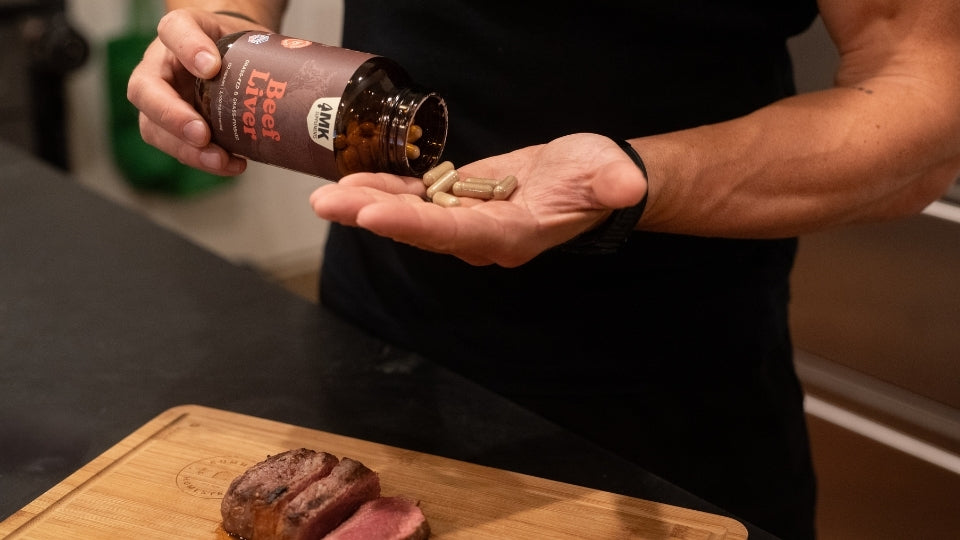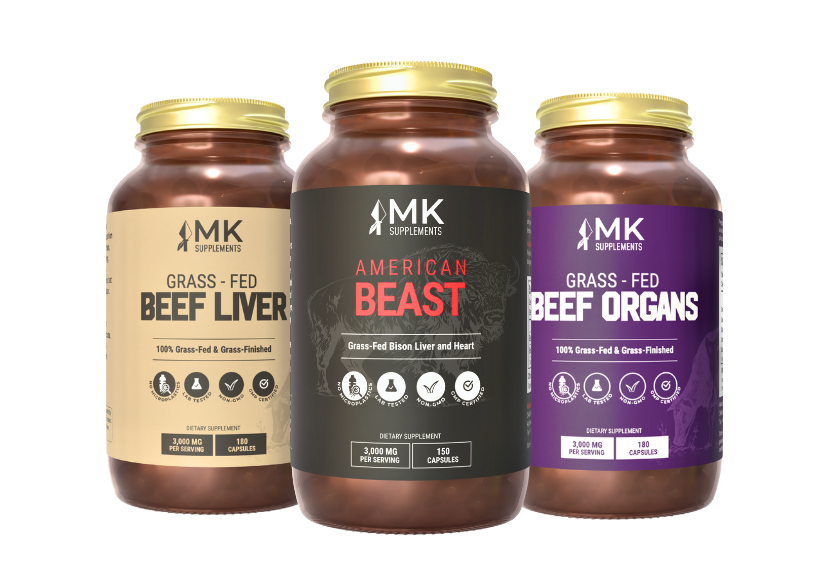
When is the best time to take beef organ supplements?
Michael KummerOrgan meat supplements have surged in popularity among those seeking a nutrient-dense boost without the taste or prep of fresh offal.
While beef liver often leads the conversation thanks to its impressive profile of Vitamin A, B-complex vitamins and heme iron, the same principles apply whether you’re taking heart, kidney, spleen, or liver powders and capsules.
In this article, we’ll explore the ideal times to integrate your organ meat supplements into your routine, as well as why timing matters and how factors such as fasting windows and other foods can influence absorption and tolerance.
Why Timing Matters For Organ Meat Supplements
Before we dive into specific windows, it’s essential to understand why timing makes a difference.
In short, our bodies don’t absorb every nutrient equally at all hours. Organ meats deliver both fat-soluble vitamins (A, D, E, K) and water-soluble B vitamins, plus highly bioavailable iron. Digestive enzyme activity, bile release, and interactions with other foods all ebb and flow throughout the day.
Key points:
- Peak stomach acid and bile production typically occur in the morning.
- Heme iron absorption is enhanced when paired with other proteins.
- Fat-soluble vitamins require dietary fat for optimal uptake.
Taking organ meat supplements when digestive function and complementary nutrients align ensures you extract the maximum benefit from every capsule or scoop.
Morning vs. Evening Dosing
Many people find the morning to be the sweet spot. Your digestive system is primed, and pairing organ powders or capsules with breakfast helps establish a nutrient-rich foundation for the day.
Benefits of morning dosing:
- Aligns with high stomach acid and bile secretion.
- Supports sustained energy via B vitamins throughout daylight hours.
- Allows flexibility for food pairing (e.g., eggs, bacon, or other proteins).
Considerations related to evening dosing:
- Some people may experience mild sleep disruption from Vitamin A if taken too late in the day.
- Late-day dosing can support overnight post-workout recovery, but try to maintain at least a two-hour gap before bedtime.
For most people, morning dosing maximizes digestive readiness and energy support, while evening dosing can be effective if you avoid late-night exposure to high Vitamin A levels.
Fasting Windows and Organ Meat Supplements
Whether you practice intermittent fasting or structured time-restricted eating, the timing of your only meal periods offers natural opportunities — and potential pitfalls — for taking organ meat supplements.
- During your fasting window: Avoid supplements to minimize GI upset and preserve the fast’s benefits.
- At the start of your eating window: Ideal for minimizing nausea and maximizing nutrient uptake alongside other proteins.
- At the end of your eating window: Acceptable, but monitor for any interference with sleep or next-day fasting comfort.
Our recommendation is to slot your organ supplements into the first meal of your eating window to balance gentle digestion with peak nutrient absorption.
Dietary Interactions to Watch
Even when you follow an animal-based dietary regimen, certain foods and beverages can compete with or inhibit the absorption of the key minerals and vitamins found in organ meats.
- Dairy (calcium): Separates iron absorption, so keep supplements and dairy at least two hours apart.
- Coffee and tea (tannins): Can bind iron, so wait 30 to 60 minutes before or after your supplement.
- Medications and antacids: Calcium-based antacids may interfere, so consult your healthcare provider if you’re on regular medications.
The bottom line is to space out calcium-rich and tannin-heavy items from your organ supplement dose to ensure optimal absorption of iron and vitamins.
Lifestyle Factors That Influence Timing
Exercise, stress levels and sleep patterns can all sway how and when you should schedule your organ meat supplements for best results.
- Exercise: Post-workout dosing supports muscle recovery and replaces iron lost through sweat.
- Stress: Chronic cortisol elevation can deplete micronutrients; consistent daily timing helps maintain steady levels.
- Sleep: Avoid high Vitamin A doses within two hours of bedtime to protect melatonin balance.
Align your supplement timing with workouts and stress patterns. And remember that consistent morning dosing often harmonizes best with an active lifestyle.
Putting It All Together: Practical Guidelines
By now, you’ve got a clear picture of when to take your organ meat supplements for superior nutrient absorption and minimal discomfort.
Here’s how to implement these principles:
- Aim for morning dosing. Take your supplement with breakfast protein.
- Honor your fasting rules. Reserve dosing for your first meal of the day, regardless of when that occurs.
- Mind your beverages. Wait before and after consuming coffee, tea or dairy products.
- Be consistent. Taking your supplements at the same time each day stabilizes levels and trains your digestive rhythm.
- Adjust as needed. If you experience nausea, try a lighter “meat-only” snack before your supplement.
Optimal timing hinges on digestive readiness, dietary pairings, and individual routines. Whether you choose liver, heart, or a mixed organ blend, slot your dose into the time that best complements your eating pattern, activity level, and lifestyle for maximum benefit.
P.S.: Our founder Michael typically consumes his supplement stack with his first meal (mid-morning), but has taken capsules at various times during the day without issue. So, while timing can play an important role, it’s not worth stressing out over it too much.

